Superstition欧美常见迷信说法
- 格式:ppt
- 大小:1.92 MB
- 文档页数:26
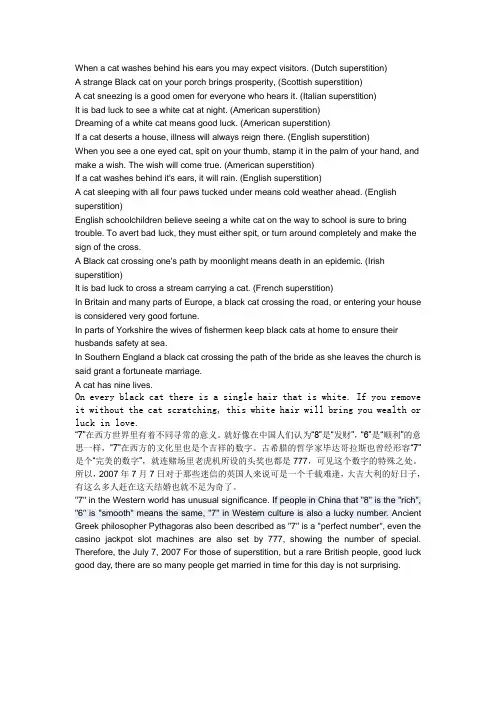
When a cat washes behind his ears you may expect visitors. (Dutch superstition)A strange Black cat on your porch brings prosperity, (Scottish superstition)A cat sneezing is a good omen for everyone who hears it. (Italian superstition)It is bad luck to see a white cat at night. (American superstition)Dreaming of a white cat means good luck. (American superstition)If a cat deserts a house, illness will always reign there. (English superstition)When you see a one eyed cat, spit on your thumb, stamp it in the palm of your hand, and make a wish. The wish will come true. (American superstition)If a cat washes behind it's ears, it will rain. (English superstition)A cat sleeping with all four paws tucked under means cold weather ahead. (English superstition)English schoolchildren believe seeing a white cat on the way to school is sure to bring trouble. To avert bad luck, they must either spit, or turn around completely and make the sign of the cross.A Black cat crossing one's path by moonlight means death in an epidemic. (Irish superstition)It is bad luck to cross a stream carrying a cat. (French superstition)In Britain and many parts of Europe, a black cat crossing the road, or entering your house is considered very good fortune.In parts of Yorkshire the wives of fishermen keep black cats at home to ensure their husbands safety at sea.In Southern England a black cat crossing the path of the bride as she leaves the church is said grant a fortuneate marriage.A cat has nine lives.On every black cat there is a single hair that is white. If you remove it without the cat scratching, this white hair will bring you wealth or luck in love.“7”在西方世界里有着不同寻常的意义。
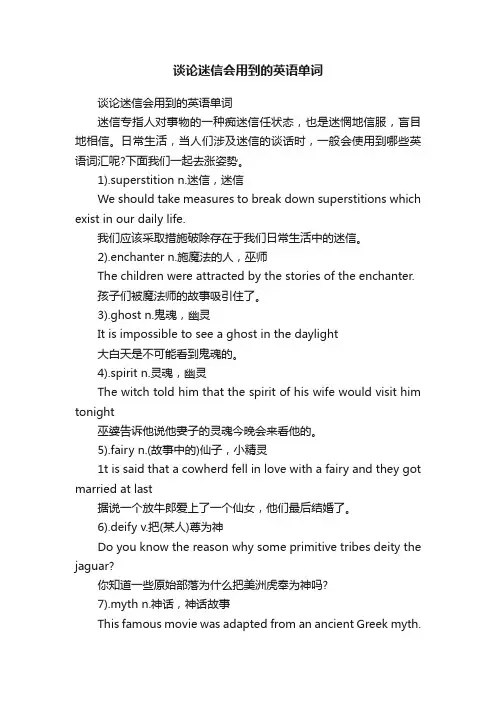
谈论迷信会用到的英语单词谈论迷信会用到的英语单词迷信专指人对事物的一种痴迷信任状态,也是迷惘地信服,盲目地相信。
日常生活,当人们涉及迷信的谈话时,一般会使用到哪些英语词汇呢?下面我们一起去涨姿势。
1).superstition n.迷信,迷信We should take measures to break down superstitions which exist in our daily life.我们应该采取措施破除存在于我们日常生活中的迷信。
2).enchanter n.施魔法的人,巫师The children were attracted by the stories of the enchanter.孩子们被魔法师的故事吸引住了。
3).ghost n.鬼魂,幽灵It is impossible to see a ghost in the daylight大白天是不可能看到鬼魂的。
4).spirit n.灵魂,幽灵The witch told him that the spirit of his wife would visit him tonight巫婆告诉他说他妻子的灵魂今晚会来看他的。
5).fairy n.(故事中的)仙子,小精灵1t is said that a cowherd fell in love with a fairy and they got married at last据说一个放牛郎爱上了一个仙女,他们最后结婚了。
6).deify v.把(某人)尊为神Do you know the reason why some primitive tribes deity the jaguar?你知道一些原始部落为什么把美洲虎奉为神吗?7).myth n.神话,神话故事This famous movie was adapted from an ancient Greek myth.这个有名的'电影是由一个古希腊神话改编而成的。
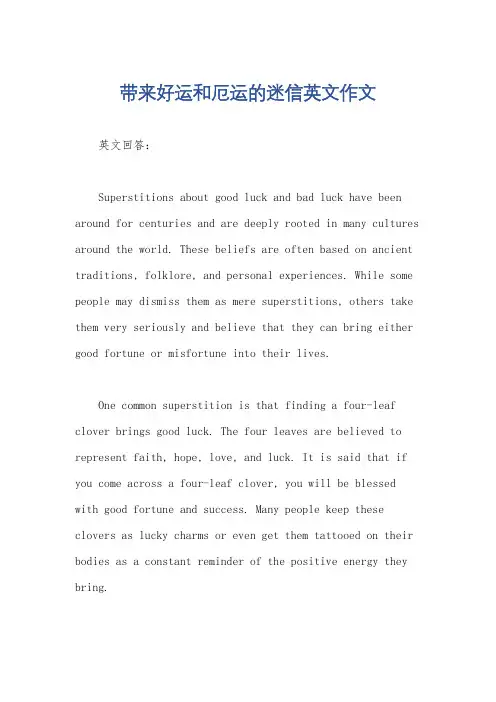
带来好运和厄运的迷信英文作文英文回答:Superstitions about good luck and bad luck have been around for centuries and are deeply rooted in many cultures around the world. These beliefs are often based on ancient traditions, folklore, and personal experiences. While some people may dismiss them as mere superstitions, others take them very seriously and believe that they can bring either good fortune or misfortune into their lives.One common superstition is that finding a four-leaf clover brings good luck. The four leaves are believed to represent faith, hope, love, and luck. It is said that if you come across a four-leaf clover, you will be blessed with good fortune and success. Many people keep these clovers as lucky charms or even get them tattooed on their bodies as a constant reminder of the positive energy they bring.On the other hand, breaking a mirror is believed to bring seven years of bad luck. This superstition dates back to ancient Rome, where mirrors were considered to be reflections of the soul. Breaking a mirror was believed to shatter the soul and bring about misfortune. To ward off this bad luck, some people believe in burying the broken pieces of the mirror under a full moon or performing a ritual to cleanse the negative energy.Another common superstition is the belief that walking under a ladder brings bad luck. This superstitionoriginated from the ancient Egyptians, who believed that triangles were sacred and walking through them woulddisrupt the natural flow of energy. To avoid the potential misfortune, people would go out of their way to walk around ladders or wait until someone else had passed through before proceeding.In Chinese culture, the number four is considered unlucky because it sounds similar to the word for "death"in Chinese. Many buildings in China skip the fourth floor or any other floor with the number four, just like someWestern buildings skip the thirteenth floor. On the other hand, the number eight is considered extremely lucky in Chinese culture because it sounds similar to the word for "wealth" or "prosperity". People often pay large sums of money to have phone numbers or license plates that contain multiple eights.In conclusion, superstitions about good luck and bad luck are deeply ingrained in many cultures and can have a significant impact on people's lives. Whether it's finding a four-leaf clover, breaking a mirror, avoiding walking under a ladder, or believing in lucky or unlucky numbers, these superstitions reflect our desire for control and belief in the power of symbols and rituals. While some may dismiss them as mere superstitions, others find comfort and reassurance in these beliefs. Ultimately, whether they bring good luck or bad luck, superstitions continue to play a role in our lives and shape our actions and decisions.中文回答:关于好运和厄运的迷信已经存在了几个世纪,并深深植根于世界各地的许多文化中。
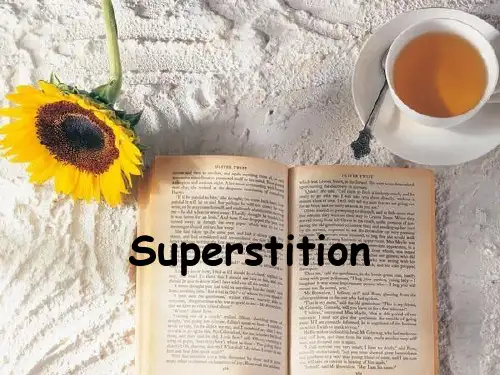

Superstitions 1in Britain 景一选译◆General Superstitions ◆◆一般的迷信◆◇Good LuckLucky to meet a black cat.Black Cats are featured on many good luck greetings cards and birthday cards in England.Lucky to touch wood.People touch or knock on wood,to make something come true.Lucky to find a clover 2plant with four leaves.A horseshoe over the door brings good luck.But the horseshoe needs to be the right way up.The luck runs out of the horseshoe if it is upside down.Horseshoes are generally a sign of good luck and feature on many good luck cards.On the first day of the month it is lucky to say “white rabbits,white rabbits,white rabbits ”before uttering your first word of the day.Catch falling leaves in Autumn and you will have good luck.Every leaf means a lucky month next year.Cut your hair when the moon is waxing 3and you will have good luck.Putting money in the pocket of new clothes brings good luck.◇关于好运遇到一只黑猫会带来好运。
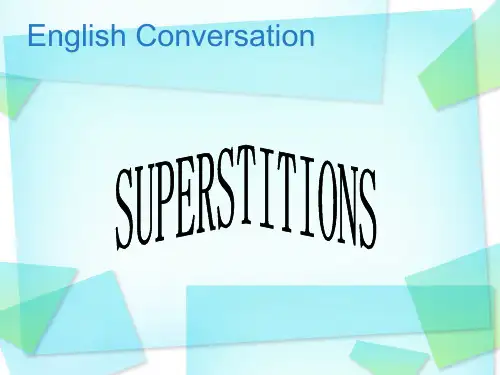
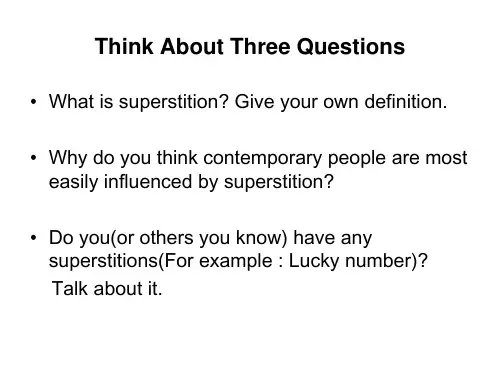

Neil: Careful Jean, don’t walk under that ladder!Jean: Why not?Neil: Because it’s bad luck!Jean: Bad luck? Neil 他不让我从一家梯子底下走,说这是不吉利的。
Neil: Yes, in Britain some people say it’s bad luck to walk under a ladder.It’s a superstition.Jean: 迷信。
A superstition.Neil: A person who believes in superstitions is called superstitious.Jean: 相信迷信的。
Superstitious. Are you superstitious, Neil?Neil: A little yes. Actually we got an email about superstitions.Jean: Oh really?Neil: Yes, Kathy in Hong Kong wants to know why people think the number thirteen is unlucky, especially Friday the thirteenth.Neil: Welcome to Ask About Britain from BBC Learning English, I’m Neil. This is the programme where we answer your questions about British life and culture.Jean: 大家好,我是董征。
That’s an interesting question. Why is the number thirteen –and especially Friday the thirteenth – considered unlucky? 为什么13 这个数字在西方被认为是不吉利的呢?尤其是碰上哪一天正好是13 号又是星期五更被称为是个最不吉利的“黑道凶日”,又是为什么呢?Neil: Here’s an expert on superstitions.InsertMa ny people are scared of it really going back to the last supper it’s said that asthere are thirteen people around the table and Jesus was crucified on the Fridaythat’s where people believe it originates from.。
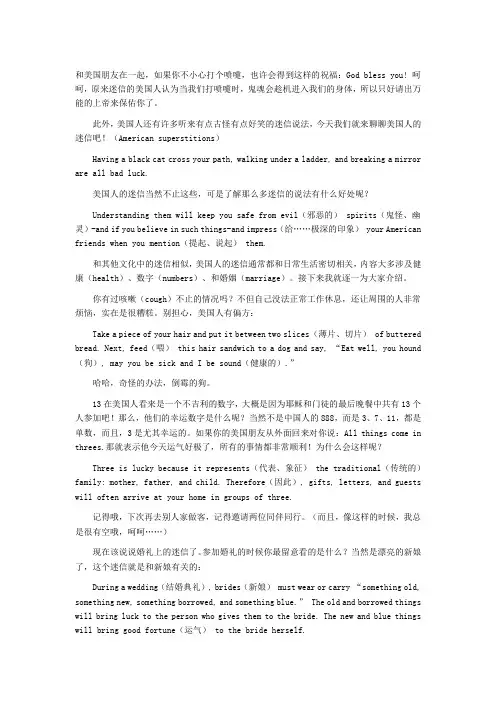
和美国朋友在一起,如果你不小心打个喷嚏,也许会得到这样的祝福:God bless you! 呵呵,原来迷信的美国人认为当我们打喷嚏时,鬼魂会趁机进入我们的身体,所以只好请出万能的上帝来保佑你了。
此外,美国人还有许多听来有点古怪有点好笑的迷信说法,今天我们就来聊聊美国人的迷信吧!(American superstitions)Having a black cat cross your path, walking under a ladder, and breaking a mirror are all bad luck.美国人的迷信当然不止这些,可是了解那么多迷信的说法有什么好处呢?Understanding them will keep you safe from evil(邪恶的) spirits(鬼怪、幽灵)-and if you believe in such things-and impress(给……极深的印象) your American friends when you mention(提起、说起) them.和其他文化中的迷信相似,美国人的迷信通常都和日常生活密切相关,内容大多涉及健康(health)、数字(numbers)、和婚姻(marriage)。
接下来我就逐一为大家介绍。
你有过咳嗽(cough)不止的情况吗?不但自己没法正常工作休息,还让周围的人非常烦恼,实在是很糟糕。
别担心,美国人有偏方:Take a piece of your hair and put it between two slices(薄片、切片) of buttered bread. Next, feed(喂) this hair sandwich to a dog and say, “Eat well, you hound (狗), may you be sick and I be sound(健康的).”哈哈,奇怪的办法,倒霉的狗。
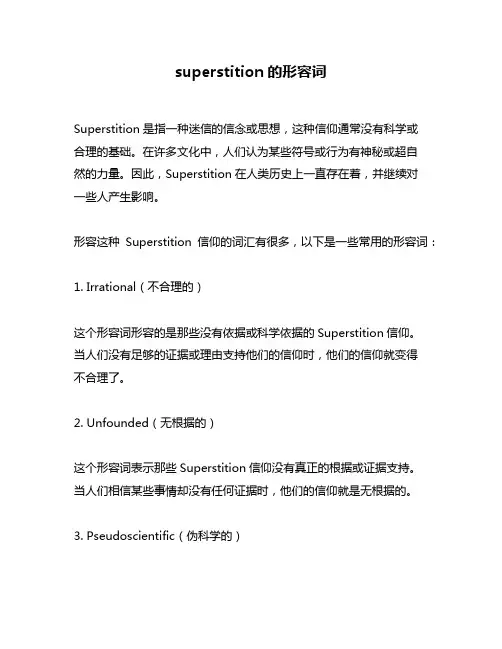
superstition的形容词Superstition是指一种迷信的信念或思想,这种信仰通常没有科学或合理的基础。
在许多文化中,人们认为某些符号或行为有神秘或超自然的力量。
因此,Superstition在人类历史上一直存在着,并继续对一些人产生影响。
形容这种Superstition信仰的词汇有很多,以下是一些常用的形容词:1. Irrational(不合理的)这个形容词形容的是那些没有依据或科学依据的Superstition信仰。
当人们没有足够的证据或理由支持他们的信仰时,他们的信仰就变得不合理了。
2. Unfounded(无根据的)这个形容词表示那些Superstition信仰没有真正的根据或证据支持。
当人们相信某些事情却没有任何证据时,他们的信仰就是无根据的。
3. Pseudoscientific(伪科学的)这个形容词形容Superstition信仰中涉及到的伪科学概念。
一些Superstition信仰涉及到了人们真实科学知识的错解,这些信仰因此被称为伪科学的。
4. Unproven(未经证实的)这个形容词形容那些Superstition信仰没有被证实是正确的。
当人们相信某些事情,但还没有足够的证据证明它们是正确的时,它们就是未经证实的。
5. Superstitious(迷信的)这个形容词直接表示了Superstition信仰中的迷信。
当人们相信某些符号或行为会给他们带来好运或坏运时,他们就是迷信的。
总体而言,这些形容词显示了Superstition的信仰通常是不合理、无根据、伪科学的,还没有得到证实。
当人们迷信地接受这些Superstition信仰时,他们会失去理性和科学精神。
因此,我们应该坚持科学的思考方式,拒绝迷信和无根据的信仰。
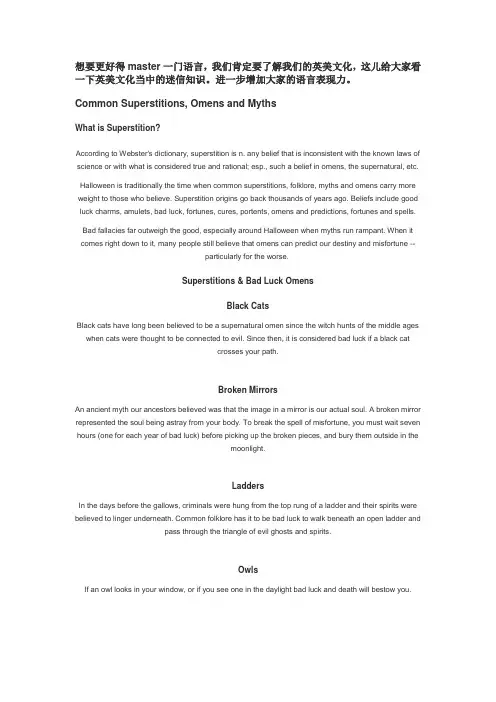
想要更好得master一门语言,我们肯定要了解我们的英美文化,这儿给大家看一下英美文化当中的迷信知识。
进一步增加大家的语言表现力。
Common Superstitions, Omens and MythsWhat is Superstition?According to Webster's dictionary, superstition is n. any belief that is inconsistent with the known laws of science or with what is considered true and rational; esp., such a belief in omens, the supernatural, etc.Halloween is traditionally the time when common superstitions, folklore, myths and omens carry more weight to those who believe. Superstition origins go back thousands of years ago. Beliefs include good luck charms, amulets, bad luck, fortunes, cures, portents, omens and predictions, fortunes and spells.Bad fallacies far outweigh the good, especially around Halloween when myths run rampant. When it comes right down to it, many people still believe that omens can predict our destiny and misfortune --particularly for the worse.Superstitions & Bad Luck OmensBlack CatsBlack cats have long been believed to be a supernatural omen since the witch hunts of the middle ages when cats were thought to be connected to evil. Since then, it is considered bad luck if a black catcrosses your path.Broken MirrorsAn ancient myth our ancestors believed was that the image in a mirror is our actual soul. A broken mirror represented the soul being astray from your body. To break the spell of misfortune, you must wait seven hours (one for each year of bad luck) before picking up the broken pieces, and bury them outside in themoonlight.LaddersIn the days before the gallows, criminals were hung from the top rung of a ladder and their spirits were believed to linger underneath. Common folklore has it to be bad luck to walk beneath an open ladder andpass through the triangle of evil ghosts and spirits.OwlsIf an owl looks in your window, or if you see one in the daylight bad luck and death will bestow you.SaltAt one time salt was a rare commodity and thought to have magical powers. It was unfortunate to spill salt and said to foretell family disarray and death. To ward off bad luck, throw a pinch over your shoulderand all will be well.SparrowsSparrows are thought to carry the souls of the dead and it is believed to bring bad luck if you kill one.Unlucky Number #13The fear of the number 13 is still common today, and avoided in many different ways. Some buildings still do not have an official 13th floor and many people avoid driving or going anywhere on Friday the 13th.Good Luck SuperstitionsHorse shoesTo bring good luck, the horseshoe must lost by a horse and be found by you, with the open end facing your way. You must hang it over the door with the open end up, so the good fortune doesn't spill out.Another origin of the 'lucky horseshoe' is the belief that they ward off witches. Witches, it was once believed, were opposed to horses, which is why they rode brooms and pitchforks instead. By placing a horseshoe over a door, the witch would be reluctant to enter. (Hat tip: Iris)Four Leaf CloversClover is believed to protect humans and animals from evil spells and is thought to be good luck to find afour leaf clover, particularly for the Irish.Rabbit's FootThese lucky charms are thought to ward off bad luck and bring good luck. You mush carry the rabbit's foot on a chain around your neck, or in your left back pocket. The older it gets, the more good luck itbrings.Wishbone sTwo people are to pull apart a dried breastbone of a turkey or chicken and the one who is left with thelonger end will have their wish come true.Common Myths & FolkloreIf the flame of a candle flickers and then turns blue, there's a spirit in the room.If a bird flies through your house, it indicates important news. If it can't get out, the news will be death.If you feel a chill up your spine, someone is walking on your future grave.A person born on Halloween will have the gift of communicating with the dead.A bat in the house is a sign of death.If a bird flies towards you, bad fortune is imminent.If your palm itches, you will soon receive money. If you itch it, your money will never come.Crows are viewed as a bad omen, often foretelling death. If they caw, death is very near.Many Romans wore lucky charms and amulets to avert the "evil eye."If a person experiences great horror, their hair turns white.A hat on a bed will bring bad luck.Eat an apple on Christmas Eve for good health the next year.The superstition of knocking on wood for good luck originates from pagan beliefs in regards to trees.。
西方常见十大迷信作者:梁小明来源:《中学生英语·教师版》2015年第06期Editor’s note: You are mistaken if you think that Westerners do not believe in superstitions. The superstitions might be different, but pretty much every country around the world has them. Here’s a list of so me of the common superstitions followed in the West to help you get a better insight into their cultures and customs.编者注:要是你认为西方人不迷信,那你就大错特错了。
不同国家迷信内容或许不同,但几乎所有国家都存在迷信。
下面是一份西方共有迷信的清单,以方便大家深入了解西方文化与风俗。
1. Friday the 13th is a bad day. 13号星期五不吉利(黑色星期五)The reason that Friday 13th in particular is unlucky is due to the massacre of the Knights Templar by Phillip IV of France on Friday the 13th.这一天之所以被视为不祥之日是因为1307年10月13日(星期五)上午法国国王腓力四世下令逮捕并屠杀境内所有的圣殿骑士团成员。
2. Bird pooing on you is good luck. 鸟粪掉身上是走运的象征One theory of this is the sort of karma logic that assumes, if something bad happens to you,then something good must happen to balance out the karma.这个理论是源于对因果报应的假设,如果你碰到一件糟心事,那么之后必要有好运来抵掉这件坏事以形成因果报应。
★英语资源频道为⼤家整理的china daily双语版:西⽅⼗⼤常见迷信,供⼤家参考。
更多阅读请查看本站频道。
Editor's note: You are mistaken if you think that Westerners do not believe in superstitions. The superstitions might be different, but pretty much every country around the world has them. Our bloggers have compiled a list of some of the common superstitions followed in the West to help you get a better insight into their cultures and customs. Feel free to leave your comments if you know of more superstitions, with their origins.要是你认为西⽅⼈不迷信,那你就⼤错特错了。
不同国家迷信内容或许不同,但⼏乎所有国家都存在迷信。
我报博主整理了⼀份西⽅共有迷信清单,以⽅便⼤家深⼊了解西⽅⽂化与风俗。
如果你知道更多的迷信内容以及其起源,可在评论区畅所欲⾔!1. Friday the 13th is a bad day. 13号星期五不吉利(⿊⾊星期五)The reason that Friday 13th in particular is unlucky is due to the massacre of the Knights Templar by Phillip IV of France on Friday the 13th.这⼀天之所以被视为不详之⽇是因为1307年10⽉13⽇(星期五)上午法国国王腓⼒四世下令逮捕并屠杀境内所有的圣殿骑⼠团成员。
神吐槽西方人的10大迷信中国有很多的小迷信,如:右眼皮跳就会很小心,筷子不能插在饭上,吃鱼不能翻,“梨”不能切开吃,送礼不能送钟表、伞和扇,尽量不会选"4"这个数字,本命年一定要穿红。
尽管不科学,但是我们仍然会注意。
同样西方也会有这种小迷信,下面是小编为您收集整理的神吐槽西方人的20大迷信,供大家参考!神吐槽西方人的10大迷信These are some crazy and weird superstitions. Feel free to add some more, I know there are so many of them in this world.世上总有些疯狂又诡异的迷信存在。
据我所知,这类迷信数量极其庞大,您也可以自由补充。
01第一条:The number 13.数字“13”It’s just a number. Yet, people tweak on Friday the 13th. Many airports don’t have a gate #13. (Like the folks at 12A won’t figure it out.) Many hotels don’t have a floor #13.这只是个数字。
但是,每逢13号的礼拜五,人们普遍都会焦虑。
很多机场没有13号登机口(好吧,你们真的以为12A登机口的乘客们不会发觉吗?)很多宾馆也没有13楼。
I was always told that the superstition is based on the idea that Judas, the bad disciple, was the 13th man to sit down to the table at The Last Supper. I think a more rational superstition would be to fear bad disciples.人们告诉我,这个关于数字13的迷信来自叛徒犹大。